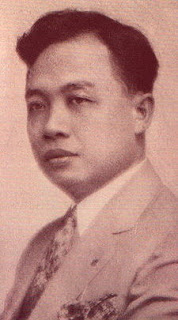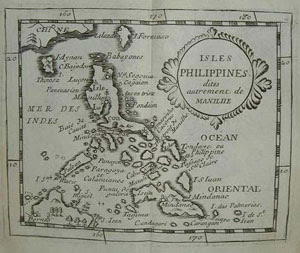1907
- Gen. Macario Sakay, one of the Filipino military leaders who had
continued fighting the imperialist United States invaders eight years
into the Philippine-American War (1899-1914),
is meted out the death sentence; essentially based on the ideals and
principles of the underground-society-turned-revolutionary-government Kataastaasang, Kagalanggalangang Katipunan nang manga Anak nang Bayan (KKK) during the Philippine Revolution against Spain, Sakay had established the Republika ng Katagalugan (entire
Philippines) with a popularly backed guerrilla operations in Morong,
Laguna, Cavite and Quezon in patriotic defiance of the colonial American
government, was deceived by colonial Gov.-Gen. Henry Clay Ide who made it appear that Sakay's
his surrender was necessary to give way to the election of an
all-Filipino Philippine Assembly legislature, falsely promising him and
his supporters amnesty; upon his deceptive abduction by the imperialist Bald Eagle authorities, Sakay could only exclaim to Dominador Gomez, the Filipino collaborator who helped in his trickery: "“Tell the Americans to face us in the open field, in honorable battle.”
1898 - Generals Artemio Ricarte and Pio del Pilar express their misgivings to President Emilio Aguinaldo y Famy as to the real nature of American policy
towards the Philippines; this as Aguinaldo issues a proclamation to the
United States and all foreign governments explaining the nature and
scope of the Revolutionary Government and the proclamation of country's
independence by provincial representatives, begging for the protection
of all nations of the civilized world and beseeching their formal
recognition of the state of belligerence and the independence of the
Philippines;” by February 4 the following year, the imperialist-in-the-making Bald Eagle nation will instigate the bloody and protracted Filipino-American War (1899-1914)
and will eventually successfully invade and occupy the Southeast Asian
nation until 1946 when it will "grant" the Philippines independence (but
not before ensuring its neocolonial status through through agreements and treaties aimed at manipulating and controlling Filipinos' political and economic lives.
Monday, August 6, 2012
Sunday, August 5, 2012
5 AUGUST
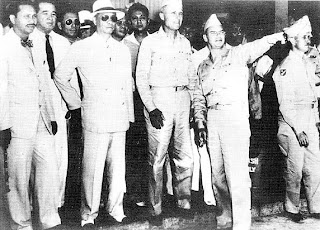 |
| President Manuel Roxas, who campaigned for Parity Rights, w/ American Clark Air Base Officials |
Saturday, August 4, 2012
4 AUGUST
 |
| Military flag of Spanish Empire from 16th to mid 18th century |
1898 - Some nine days prior to the infamous Mock Battle of Manila that would falsely make it appear that the Americans, instead of the Filipino revolutionaries, defeated the Spanish colonial forces in the Southeast Asian archipelago and the capital, Manila, Consul Oscar F. Williams of the emerging imperialist United States cables American Secretary of State William R. Day to report that he has tried to convince Gen. Emilio Aguinaldo y Famy that American rule over the Philippines will supposedly bring greater honor, progress, and profit to the natives compared to any scheme the Filipino leader and his advisers can ever devise; Williams adds that he is on better terms with Aguinaldo than the United States military commanders are with Aguinaldo, the leader of the second phase of the Philippine Revolution who has stupidly forged an "alliance" with U.S. Admiral George Dewey and believed his and other American military and diplomatic officials' verbal deceptive promises that the Bald Eagle nation will honor Philippine independence; apparently realizing that the imperialist Americans have him duped, Aguinaldo--who weeks earlier even ridiculously instructed his men to allow the G.I.'s to freely enter the archipelago--will then try to 'negotiate' Filipinos' independence; the Mock Battle of Manila will form the prelude to the baseless December 1898 Treaty of Paris where by that time, the virtually expelled Spaniards will supposedly "cede" the Philippines to imperialist America, ultimately leading to the bloody and protracted Filipino-American War (1899-1914).
Friday, August 3, 2012
3 AUGUST
1900 - One and one-half years into the protracted and bloody period of American invasion (Filipino-American War, 1899-1914), the President of the Philippine Republic-on-the-run Emilio Aguinaldo issues a manifesto wherein he appeals to the Filipinos not to listen to native collaborators but, rather, to continue fighting without end in defence of their rights until victory against the imperialist enemy is achieved and independence won and recognized.
 1901 - exactly a year later, following the capture of several officials and their subsequent swearing of fealty to the imperialist Bald Eagle nation, including Aguinaldo, Gen. Ambrosio Mojica, Gen. Vicente Lukban of the Samar-Leyte command issues a proclamation, part of which says:
1901 - exactly a year later, following the capture of several officials and their subsequent swearing of fealty to the imperialist Bald Eagle nation, including Aguinaldo, Gen. Ambrosio Mojica, Gen. Vicente Lukban of the Samar-Leyte command issues a proclamation, part of which says:
1898 - In a speech at Kawit in Cavite province, Emilio F. Aguinaldo, President of the fledgling Philippine Republic, pleads with local officials to keep unity, peace, and upright conduct; the appeal comes amidst apprehensions expressed by Felipe Agoncillo and Apolinario Mabini, Aguinaldo's diplomatic official and key adviser, respectively, over the former's supposed "alliance" with the Americans, with some Filipino soldiers already thinking at that point they they might need to fight a war with the pale-skinned US forces.
Photo credit: http://philippineamericanwar.webs.com/thelastholdouts.htm
 1901 - exactly a year later, following the capture of several officials and their subsequent swearing of fealty to the imperialist Bald Eagle nation, including Aguinaldo, Gen. Ambrosio Mojica, Gen. Vicente Lukban of the Samar-Leyte command issues a proclamation, part of which says:
1901 - exactly a year later, following the capture of several officials and their subsequent swearing of fealty to the imperialist Bald Eagle nation, including Aguinaldo, Gen. Ambrosio Mojica, Gen. Vicente Lukban of the Samar-Leyte command issues a proclamation, part of which says: "Nothing, in truth, is more natural than that we should continue the struggle, whatever be the obstacles placed in our way and despite the capture of him who was our generals;… We should let the world know that the Philippine army is captured, another at once comes forward and succeeds him; that we fight, not at the suggestion of others, but because of our own personal convictions; and that, finally, we are worthy of independence and of universal respect, because we know our rights and how to die in their defense…"
Photo credit: http://philippineamericanwar.webs.com/thelastholdouts.htm
Thursday, August 2, 2012
2 AUGUST
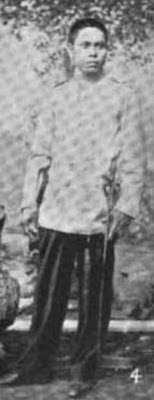 |
| Hen. Isidoro Torres y Dayao |
Wednesday, August 1, 2012
1 AUGUST
 |
| Pangulong Manuel L. Quezon (1878-1944) |
1944 - Manuel Luis Quezon, first President of the Commonwealth of the Philippines under the colonial occupation of the imperialist United States, dies from tuberculosis at Saranac Lake, New York during World War II while the Southeast Asian country was under Japanese Occupation.
Tuesday, July 31, 2012
31 JULY
 |
| Colonial body Philippine Assembly, imperialist US Occupation |
Photo credit: http://philippineamericanwar.webs.com/
Monday, July 30, 2012
30 JULY
1934 - During the imperialist American Period, Claro M. Recto is elected president of the Constitutional Convention
tasked with framing what would be called the 1935 Constitution of
colonial Philippines; Recto, an outspoken Filipino nationalist and critic of the
United States Military Bases, will die in Rome in 1960 due to
a mysterious heart attack suspected to be a work of the Bald Eagle's Central
Intelligence Agency based on an earlier CIA plan to assassinate him with
a vial of poison,
his having no known heart ailment, and the US agency's record of
playing 'holed condom' electoral dirty tricks on the solon during his
presidential bid in the 1957 presidential elections.
1896 - Filipino reformist, patriot and polymath Jose Mercado Rizal receives a letter from Gov.-Gen. Ramon Blanco permitting him to work as physician for the Spanish Army in Cuba,
1601 - Antonio de Morga, Spanish colonial judge for the Philippine Islands during the colonial rule of Spin writes King Philip II about his services in equipping and supplying and leading the naval battle with Dutch corsairs who have been preying on shipping that enter Manila harbor.
1896 - Filipino reformist, patriot and polymath Jose Mercado Rizal receives a letter from Gov.-Gen. Ramon Blanco permitting him to work as physician for the Spanish Army in Cuba,
1601 - Antonio de Morga, Spanish colonial judge for the Philippine Islands during the colonial rule of Spin writes King Philip II about his services in equipping and supplying and leading the naval battle with Dutch corsairs who have been preying on shipping that enter Manila harbor.
Sunday, July 29, 2012
29 JULY
Photo credit: http://www.chrispforr.net/row2/chrisphil7/neocolonial/neocolonial.htm
Saturday, July 28, 2012
28 JULY
 |
| Imperialist American Civil Gov.-Gen William Forbes (right, back row) |
-- 54 years earlier, on July 28, 1855, Juan B. Marcaido is granted a gold medal for his efforts and studies on the method of banana fiber extraction by the Economics Society of Friends of the Country; on July 28, 1963, 24 Philippine Boy Scouts and Scouter delegates to the 11th Boys Scout World Jamboree in Marathon, Greece, perish in a airplane crash in the Arabian Sea.
Photo credit: http://manila.usembassy.gov/wwwjq561.jpg
Friday, July 27, 2012
27 JULY
 1645
- Native Muslims attack the Spanish garrison with help from a Dutch
squadron that arrives at Jolo from Batavia (North Jakarta) during Spain's colonial rule of the Philippines; the Filipino-Spanish troops
under Commander Esteban Ugalde will resist and finally force the withdrawal of the squadron after three days of combat
in what would be one of the few unsuccessful attempts of the
Dutch to expel the Spaniards from the Philippine islands; the contexts are
Spain's tenuous hold on Mindanao and the so-called 80 Years War of Netherlands' revolt and, subsequently, assertion of its independence; Spain's colonization of the Southeast Asian islands began in the mid 1500s when King Philip II sent sent an expedition to conquer said archipelago in 1559 following earlier exploration missions including that led by Ferdinand Magellan who was killed by the native chieftain Lapu-Lapu and his forces in the island of Mactan.
1645
- Native Muslims attack the Spanish garrison with help from a Dutch
squadron that arrives at Jolo from Batavia (North Jakarta) during Spain's colonial rule of the Philippines; the Filipino-Spanish troops
under Commander Esteban Ugalde will resist and finally force the withdrawal of the squadron after three days of combat
in what would be one of the few unsuccessful attempts of the
Dutch to expel the Spaniards from the Philippine islands; the contexts are
Spain's tenuous hold on Mindanao and the so-called 80 Years War of Netherlands' revolt and, subsequently, assertion of its independence; Spain's colonization of the Southeast Asian islands began in the mid 1500s when King Philip II sent sent an expedition to conquer said archipelago in 1559 following earlier exploration missions including that led by Ferdinand Magellan who was killed by the native chieftain Lapu-Lapu and his forces in the island of Mactan.Photo credit: http://www.absoluteastronomy.com/topics/Sulu_Archipelago
Thursday, July 26, 2012
26 JULY
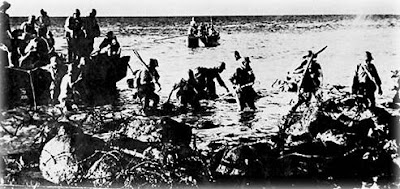 |
| Japanese occupies the US colony, the Philippines |
Photo credit: http://www.smccd.net/accounts/skylib/oralhist/Ignacio/
Wednesday, July 25, 2012
25 JULY
 |
| Hen. Santiago V. Alvarez |
Tuesday, July 24, 2012
24 JULY
 |
| Filipinos captured by American invaders |
Photo credit: Filipiniana.net
Monday, July 23, 2012
23 JULY
 1864 - Apolinario Mabini y Maranan, the future "Brains of the Philippine Revolution", key adviser, and Foreign Minister of what would be the short-lived Philippine Republic under Gen. Emilio Aguinaldo, is born in Talaga, Tanauan, Batangas to Dionisia Maranan and Inocencio Mabini during the Spanish colonial rule; acquiring paralysis later in adulthood, Mabini will be summoned to become an adviser of Aguinaldo who, by that time, had already seized revolutionary leadership from Generalissimo Andres Bonifacio y de Castro during the time of the Philippine Revolution against Spain; Mabini will be one of the few officials of the fledgling Philippine Republic that will for some time resist the pressure of swearing fealty to the imperialist United States of America during the Filipino-American War (1899-1914) ; it will be the second phase of the Philippine Revolution that Mabini will become a key Filipino figure--his counterpart during the initial phase of the Himagsikan led by Bonifacio, co-founder and Supremo of the Kataastaasang Kagalanggalangang Katipunan nang manga Anak nang Bayan, will be Emilio Jacinto y Dizon, who will earn the title "Brains of the Katipunan; a few years before his death, Mabini will author his memoirs of the Philippine Revolution, including his account of Aguinaldo's "insubordination" to, and the tragic "crime" and "assassination" committed against Bonifacio.
1864 - Apolinario Mabini y Maranan, the future "Brains of the Philippine Revolution", key adviser, and Foreign Minister of what would be the short-lived Philippine Republic under Gen. Emilio Aguinaldo, is born in Talaga, Tanauan, Batangas to Dionisia Maranan and Inocencio Mabini during the Spanish colonial rule; acquiring paralysis later in adulthood, Mabini will be summoned to become an adviser of Aguinaldo who, by that time, had already seized revolutionary leadership from Generalissimo Andres Bonifacio y de Castro during the time of the Philippine Revolution against Spain; Mabini will be one of the few officials of the fledgling Philippine Republic that will for some time resist the pressure of swearing fealty to the imperialist United States of America during the Filipino-American War (1899-1914) ; it will be the second phase of the Philippine Revolution that Mabini will become a key Filipino figure--his counterpart during the initial phase of the Himagsikan led by Bonifacio, co-founder and Supremo of the Kataastaasang Kagalanggalangang Katipunan nang manga Anak nang Bayan, will be Emilio Jacinto y Dizon, who will earn the title "Brains of the Katipunan; a few years before his death, Mabini will author his memoirs of the Philippine Revolution, including his account of Aguinaldo's "insubordination" to, and the tragic "crime" and "assassination" committed against Bonifacio. 1567 - Miguel Lopez de Legaspi, the Spanish conquistador who forged a blood compact with the Filipino natives and deceived them into thinking that his people were friends, subsequently facilitating Spain's colonization of the Southeast Asian islands, reports to King Philip II about how Chinese and Japanese come yearly to some islands in the archipelago, such as Luzon and Mindoro, to trade silk, wool bells, iron, tin, porcelains, perfumes, colored cotton cloths and other small wares in exchange for gold and wax.
Raw image credit: National Historical Institute
Subscribe to:
Posts (Atom)

